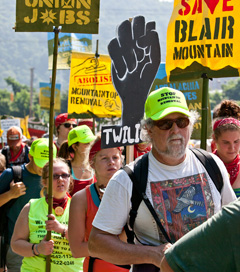Honest, paywall-free news is rare. Please support our boldly independent journalism with a donation of any size.
Deep in coal country, a revolution is brewing. In rural West Virginia, nearly 500 people have been marching since Monday, June 6, to fight against mountaintop removal, for a new clean economy and to remember the battle at Blair Mountain, the largest armed labor battle in United States history that was fought at its base more than 90 years ago.
Dubbed Appalachia Rising: The March on Blair Mountain, the marchers are retracing the steps of the original march that preceded the 1921 battle that pitted union organizers against mercenaries hired by coal companies to fight unionization in southern West Virginia counties. Setting the stage for the American labor movement, the battle left what one expert estimates to be hundreds dead from nearly one millions rounds of ammunition.
But, now, the unprotected battle site is under threat by coal companies using the dangerous excavation tactic known as mountaintop removal.
“Mountaintop removal is the worst idea engineers ever thought of,” said Barbara Rasmussen, a historian in Morgantown, West Virginia, and president of the advocacy organization Friends of Blair Mountain, by phone. For Rasmussen, “Blair Mountain is a monument to efforts made for every American. Every American with work-related benefits owes them to the miners who fought at Blair Mountain. Tearing down someone's monument is an injustice,” she said. It is a “terrible act of social violence,” she added.
Because of its status, she also believes that Blair Mountain connects the dots of many issues, such as labor rights, historical preservation, as well as the dangers of mountaintop removal.
The sense of unity despite divergent reasons is evident in the newest battle for Blair Mountain, said Chuck Keeney, a history professor at Southern West Virginia Community and Technical College, by phone. Like Rasmussen, he sees the march as a chance to bring divergent groups together. “Blair Mountain is an umbrella under which different groups can unite, where environmentalists and coal miners can meet,” he said.
Click here to get Truthout stories like this one sent straight to your inbox, 365 days a year.
Indeed, Keeney has a reason for being involved that no one else can claim. He is the great-grandson of Frank Keeney, who was the president of the West Virginia division of United Mine Workers of America and an organizer of the original march to Blair Mountain in 1921. But he has also, like a number of the marchers, been active in the contentious fight to preserve the site, which has pitted activists like him against coal mining operators who, as he sees it, run West Virginia.
Part of that fight involved Rasmussen. She and her colleagues fought for years to have the battleground site given a nationally recognized historic designation, which could help protect it from many of the hazards that mountaintop removal causes. And in 2006, they finally saw it designated as one. But Rasmussen, echoing Keeney's sentiment about who's really in charge in West Virginia, saw her work go to waste. Under pressure from coal mining companies, the historical designation was reversed only nine months later.
The marchers have been met with mixed results. While they have been walking in 97-degree heat and faced torrential rain, they also have been greeted warmly along their route by many. One couple brought flowers to the media headquarters. But unfortunately, as the Charleston Daily Mail reports, The United Mine Workers union declined to officially join and sponsor the march because some marchers have goals beyond the preservation of Blair Mountain.
To Dustin Steele, a student at Marshall University in Huntington, West Virginia, who is among the marchers, the urgency he feels about this march goes beyond the historical relevancy of Blair Mountain, though. Having seen the results of mountaintop removal nearly every day while growing up, he said in a press release,” I see my future being stripped away by irresponsible mining practices, specifically mountaintop removal. Mountaintop removal strips the prospect of a sustainable future by taking the health and vitality of Appalachia's most important resource – its people.”
A terrifying moment. We appeal for your support.
In the last weeks, we have witnessed an authoritarian assault on communities in Minnesota and across the nation.
The need for truthful, grassroots reporting is urgent at this cataclysmic historical moment. Yet, Trump-aligned billionaires and other allies have taken over many legacy media outlets — the culmination of a decades-long campaign to place control of the narrative into the hands of the political right.
We refuse to let Trump’s blatant propaganda machine go unchecked. Untethered to corporate ownership or advertisers, Truthout remains fearless in our reporting and our determination to use journalism as a tool for justice.
But we need your help just to fund our basic expenses. Over 80 percent of Truthout’s funding comes from small individual donations from our community of readers, and over a third of our total budget is supported by recurring monthly donors.
Truthout has launched a fundraiser, and we have a goal to add 231 new monthly donors in the next 48 hours. Whether you can make a small monthly donation or a larger one-time gift, Truthout only works with your support.
